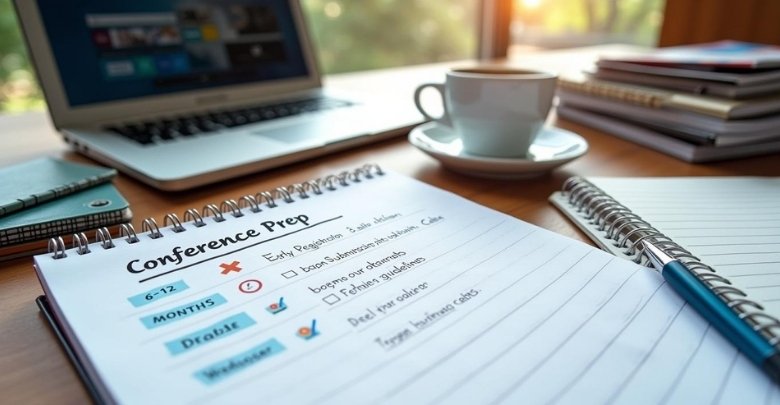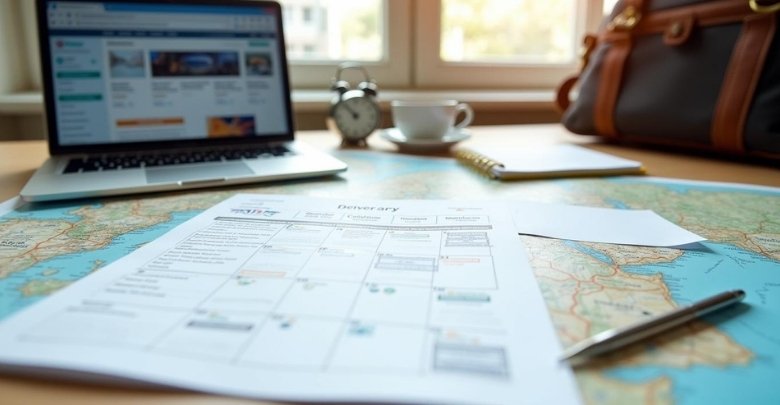You can learn, network, and grow professionally at a conference. But making the most of it requires more than just showing up—it’s all about preparation. So, how far in advance should you plan to attend a conference?
Ideally, you should start preparing 6-12 months ahead. This timeline allows you to research events, set a budget, handle visa applications, and book travel. As the date approaches, focus on networking, fine-tuning your schedule, and ensuring everything is in place for a smooth experience.
In this guide, we’ll walk you through a step-by-step process to help you stay organized and make the most of your conference journey. Let’s get started!
How Far in Advance Should You Plan to Attend a Conference?
Attending a conference requires thoughtful preparation, and the timeline often depends on several factors. Starting early ensures you have ample time to research, arrange travel, and prepare materials. A general rule of thumb is to begin planning 6-12 months before the event. This period allows for thorough preparation, minimizing last-minute stress and maximizing your conference experience.

Researching the Right Conference for You
Finding the perfect conference to attend can take time. You need to identify events that align with your goals and interests. Research should start at least 12 months in advance to ensure you choose one that suits your needs.
Evaluating the event’s reputation and topics is essential. Check for reviews or feedback from past attendees to understand its value. This early research helps ensure your participation will be worthwhile and impactful.
Once you’ve shortlisted options, confirm their dates and locations. This allows you to plan other commitments around the conference schedule. Early planning also helps secure availability for high-demand events.
Budgeting and Financial Considerations
Understanding your financial capacity plays a key role in early planning. Conferences often involve fees for registration, travel, and lodging. Budgeting 12 months ahead ensures you save enough to cover these costs comfortably.
Many conferences offer early-bird discounts. These reduced rates are available months in advance, helping attendees save significantly. Tracking such opportunities can make attending more affordable.
Don’t forget about hidden costs. Meals, transportation, and other incidental expenses can add up. Planning allows you to anticipate and prepare for these costs effectively.
Visa and Travel Arrangements
For international conferences, visas are a top priority. Start the application process 6-12 months in advance to avoid delays. Some countries require additional documentation or interviews, which take time to complete.
Research visa requirements for the host country as soon as possible. This includes understanding timelines, fees, and necessary paperwork. Early applications reduce the risk of last-minute complications.
Booking flights and accommodations should also be done early. High-demand periods can lead to skyrocketing prices. Reserving in advance secures better options at reasonable rates.
Registering for the Conference
Registering early has multiple benefits. Many conferences offer discounts for those who sign up months ahead. This can save you money and secure your spot.
Popular conferences may sell out quickly, especially when it comes to upcoming international conferences that draw large, diverse audiences. Early registration ensures you don’t miss out on attending a sought-after event, particularly in niche industries where spaces fill up fast.
Additionally, registering early gives you access to exclusive opportunities, such as pre-conference workshops or tailored networking sessions. Being proactive often comes with valuable perks that enhance your overall experience.
Preparing Materials and Presentations
If you’re presenting or exhibiting, start preparing 3-6 months in advance. Create engaging materials to showcase your ideas effectively. This preparation ensures confidence and professionalism during the event.
Review guidelines provided by the conference organizers. These may include format requirements or deadlines for submitting presentations. Adhering to these ensures a smooth experience.
Rehearse your presentation multiple times. Practice helps refine your delivery, making it more impactful and polished. Confidence is key to leaving a lasting impression.
Networking and Building Connections
Building professional connections doesn’t begin at the conference. Start reaching out to other attendees months in advance. Many conferences share attendee lists or networking tools early.
Use platforms like LinkedIn to connect with speakers and participants. Introduce yourself and express your interest in collaborating. Early networking lays the groundwork for meaningful conversations.
Planning networking goals is equally important. Identify specific individuals or groups you want to engage with. This focus helps maximize your conference experience.
Reviewing the Final Details
The final months before the conference are for polishing your plans. Double-check travel, lodging, and conference schedules for accuracy. Ensuring everything is set avoids unnecessary stress.
Pack strategically, including essential documents, tech gear, and business cards. Being prepared ensures you present yourself professionally during the event.
Prepare mentally for the experience. Review your goals and agenda to make the most of your time. Confidence comes from thorough preparation.
Why Early Planning Matters for Conference Success?
Attending a conference is a significant investment in your personal and professional growth. However, success often depends on thorough preparation. Early planning not only ensures a smooth experience but also allows you to maximize opportunities and reduce unnecessary stress. Let’s explore why planning ahead is essential.
Securing Spots and Discounts
Many conferences offer limited spots, and early registration ensures you don’t miss out on attending the event. Early bird discounts are another benefit, helping you save significantly on registration fees. Additionally, booking accommodations and flights early provides access to better rates and preferred options. These savings and assurances make the effort of early planning worthwhile.
Maximizing Networking Opportunities
Planning in advance allows you to identify key attendees and schedule meetings in advance, building meaningful connections before the event. This approach helps you strategize your networking efforts, focusing on individuals or organizations that align with your goals. Early communication can also open doors to collaborative opportunities during the conference. Meaningful connections often result from this proactive approach.
Preparing Effective Presentations
If you’re presenting or leading a workshop, starting early gives you time to create a polished, impactful presentation. Early preparation ensures you meet submission deadlines, avoiding any last-minute stress or errors. It also allows for multiple revisions, ensuring your message resonates with the audience. A well-prepared presentation enhances confidence and leaves a lasting impression.
Managing Travel and Logistics
Booking travel arrangements in advance ensures availability and eliminates the risk of inflated prices closer to the event. It also allows for better travel planning, such as choosing optimal flight times or preferred accommodations. Packing essentials without rushing ensures you have everything from business cards to necessary tech gear. Organized logistics make your experience seamless and stress-free.
Enhancing Event Engagement
Reviewing the conference agenda well in advance helps you prioritize sessions that align with your personal and professional goals. Familiarizing yourself with speakers and topics ahead of time improves your participation during discussions or Q&A sessions. This preparation enables you to engage meaningfully and extract maximum value from the experience. Advanced planning creates a more enriching conference journey.
Reducing Stress and Building Confidence
Organized preparation reduces last-minute pressure, allowing you to focus on enjoying and learning during the conference. Being fully prepared also enhances your confidence, making networking and participation more comfortable and effective. Confidence and calmness are key to making a strong impression in professional settings. Early planning is the foundation for both.
What Should You Do 6-12 Months Before the Conference?
Planning for a conference starts well in advance to ensure you get the most out of the experience. This 6-12 month period is essential for laying a strong foundation for your participation. From researching events to preparing materials, every step matters. Let’s break down the key actions to take during this time.
Identify Relevant Conferences
Start by researching conferences that align with your professional goals and interests. One of the best way to find conferences is by exploring industry websites and publications that list upcoming events. Prioritize those with topics, speakers, or audiences that resonate with your objectives. Choosing the right conference sets the stage for a meaningful experience.
Set Clear Goals
Determine what you aim to achieve by attending the conference, such as learning new skills or expanding your network. Identify specific people or organizations you’d like to connect with during the event. Establishing goals helps focus your efforts and maximize your time. Clarity in objectives leads to better outcomes.
Create a Realistic Budget
Estimate the costs, including registration fees, travel expenses, accommodation, and daily meals. Explore funding opportunities like employer support, grants, or sponsorships to ease financial burdens. A well-planned budget helps avoid overspending while ensuring a smooth experience. Financial preparedness enhances peace of mind during the event.
Submit Proposals on Time
If the conference accepts submissions, prepare and submit proposals for presentations, workshops, or panels. Carefully review submission guidelines to ensure your proposal meets the requirements and deadlines. Strong submissions increase your chances of being accepted and gaining visibility. Presenting adds value to your participation and builds credibility.
Book Travel and Accommodation
Secure flights and hotel reservations as early as possible for better rates and options. Research visa requirements and begin the application process early if needed. Early bookings reduce stress and guarantee availability for popular destinations. Timely travel arrangements set the tone for a seamless journey.
Prepare Marketing Materials
Order or update business cards with accurate contact information to distribute during the event. Create brochures, flyers, or other promotional materials that highlight your work or business. Having these resources ready enhances your visibility and engagement. Professional materials leave a lasting impression on potential collaborators or clients.
Build a Strategic Schedule
Review the preliminary conference agenda to identify key sessions and activities relevant to your goals. Schedule meetings with potential collaborators, mentors, or clients ahead of time. A planned schedule ensures you don’t miss opportunities that matter. Time management during the event boosts productivity and satisfaction.
Engage in Pre-Event Networking
Join online groups or forums related to the conference to connect with other attendees early. Participate in discussions on platforms like LinkedIn or Twitter using the event’s hashtag. Building relationships before the event creates a warm start to in-person interactions. Early engagement fosters a sense of community and belonging.
Invest in Professional Development
Identify skills or knowledge gaps and take relevant courses or training to prepare for the conference. Enhancing your expertise before the event ensures you make the most of learning opportunities. Confidently approaching sessions and discussions adds value to your participation. Growth-oriented preparation contributes to long-term success.
How to Prepare Materials and Finalize Your Schedule?
Preparing materials and organizing your schedule is essential for a successful conference experience. These steps help you present yourself professionally and maximize your time. A little preparation goes a long way in ensuring you’re confident and ready to engage.
- Create engaging presentations that align with conference themes. Use visuals and concise points to communicate ideas effectively, ensuring they leave a lasting impression.
- Customize your materials for the audience you’ll meet. Design your handouts, brochures, or slides to address their specific needs and interests during discussions.
- Test your equipment well before the event. Ensure your laptop, projector, and other devices are functional to avoid technical hiccups during your presentation.
- Review the conference agenda and prioritize sessions. Choose those most relevant to your goals and block time for networking opportunities in between.
- Prepare a list of questions to ask speakers or peers. Engaging conversations often stem from thoughtful inquiries, which showcase your interest and develop connections.
- Pack essentials like business cards, chargers, and printed materials. Being well-equipped ensures you’re ready for any opportunity that arises during the event.
- Set realistic goals for each day of the conference. Focus on achieving key outcomes like meeting specific people or attending high-value sessions.
Finalizing your materials and schedule isn’t just about preparation—it’s about setting yourself up for success. With these tips, you’ll make a polished impression and get the most out of your conference experience!
When Should You Register and Book Travel Arrangements?
Register for a conference as early as possible to secure your spot and access any early-bird discounts. Popular events often sell out quickly, so timely registration helps you avoid missing key opportunities. Booking travel and accommodations early ensures you get better prices and convenient options near the venue. Planning ahead also allows you to fully realize the value of conference attendance, maximizing both cost savings and the overall experience.
Booking flights and hotels at least three to six months in advance gives you flexibility and peace of mind. Early planning helps avoid last-minute hassles like unavailable accommodations or expensive fares. Confirm all travel details and align them with the conference agenda to prevent scheduling conflicts. Staying organized and proactive ensures a smooth and stress-free journey, allowing you to focus entirely on the conference itself.
FAQs About Advance Planning Preparations to Attend a Conference
Planning for a conference can feel overwhelming, but starting early ensures a stress-free experience. Below are five frequently asked questions to guide you as you prepare for your next event. Here are the details!
How Can I Choose the Right Conference to Attend?
Research conferences that align with your career goals and industry interests. Look for events featuring relevant topics, speakers, and audiences. Checking reviews or feedback from past attendees also ensures the event’s value and helps with decision-making.
When Should I Start Planning My Conference Budget?
Start budgeting at least a year before the conference to account for fees, travel, and accommodation. Early planning helps identify hidden costs like meals and transportation, ensuring you allocate enough funds for a smooth experience.
What Documents Should I Prepare for an International Conference?
Prepare a valid passport, visa, and any additional documentation required by the host country. Include conference registration details and hotel confirmations. Keep copies of these documents handy to avoid delays during your travels.
How Can I Make the Most of Networking Opportunities?
Begin networking months in advance by connecting with attendees or speakers on social media platforms. Plan specific people or groups to engage with during the event. Early efforts lay the foundation for meaningful professional relationships.
What Should I Do If My Plans Change After Registration?
Contact the organizers immediately to discuss possible cancellations or changes. Many conferences offer flexible policies for early communication. Make sure to update travel arrangements to minimize financial losses and adjust your plans accordingly.
Bottom Lines
Planning for a conference is a rewarding investment in your personal and professional growth. Starting early allows you to research events, prepare materials, and organize logistics smoothly. So, how far in advance should you plan to attend a conference? Ideally, 6-12 months provides the perfect window to ensure every detail is managed effectively.
From securing early-bird discounts to creating a polished presentation, proactive planning ensures you maximize opportunities. With thoughtful preparation, you can reduce stress, boost confidence, and focus entirely on gaining valuable insights and connections. Begin today to set the stage for a successful and enriching conference experience!







